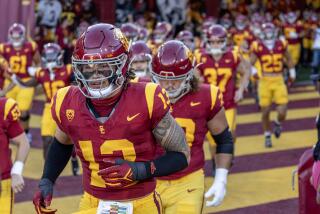THE DEATH OF HANK GATHERS : The Extent of Doctors’ Role Becomes Point of Contention : Ethics: Gathers’ death raises questions about responsibility of both the university and the team physicians.
- Share via
The death of Loyola Marymount basketball star Hank Gathers has raised questions about the role physicians play in the arena of big-time college athletics.
Medical ethicists agree that if Gathers ignored the advice of a cardiologist that he should stop playing basketball, then there was little the physician could do to stop him outside of breaking an adult patient’s right to privacy.
But in cases where the health risks to an athlete appear great enough, should university or team officials insist that they be informed so that they can determine a course of action? Should it be the team physician’s duty to monitor a player’s compliance with their prescribed medical treatment?
And should an athlete, informed of the risks, have the final say in cases where the player’s decision may be colored by the lure of great financial rewards in a professional sports career?
“Physicians are always torn by their interest in the health of the athlete as well as the athlete’s overall desire to play,” said Arthur Caplan, director of the Center for Biomedical Ethics at the University of Minnesota. “But it’s always up to the patient to weigh the risks, and the presumption is that ultimately the patient will determine the course of medical care.
“In cases like this, however, the physicians have a strong obligation not just to tell the patient what the risks are, but to make sure that they understand what they are. That is especially important since most young athletes see themselves as immortal.”
A cardiologist familiar with Gathers’ case told the Times that the Loyola star was told not to play basketball, or even to exercise, if he wanted to reduce the risk to his health. He said Gathers ignored the advice, but Loyola officials said they were never told of the cardiologist’s assessment.
Medical ethicists say that in cases where physicians may have trouble assessing the degree of risk a person faces from a heart abnormality, it becomes more difficult for doctors to convince players that their health may be endangered.
“Clearly an ethical physician will couch a serious health risk in terms that the player can understand, such as, ‘If you keep playing, you could die,’ ” said Dr. Albert Jonsen, professor of ethics and medicine at the University of Washington School of Medicine. “But, just as clearly, the young man with a promising sports career may not accept that, especially if he feels healthy.”
The lines of medical responsibility are further clouded by the fact that there are few cases in which a physician can tell a patient absolutely what exercise they should or should not do.
Although Gathers was known to have had so-called cardiac arrhythmia, an abnormality of the rate of the heartbeat, the precise cause of his death is unknown. The Los Angeles County coroner’s office has ordered further toxicological tests and tissue studies and the results probably won’t be known for several days.
However, the New York Times, citing an unidentified physician, reported Wednesday that Gathers’ condition was diagnosed as a potentially fatal heart disease called cardiomyopathy. A conference of cardiologists on sudden death in athletes concluded four years ago that persons with cardiomyopathy should be disqualified from competitive sports. But university officials said they were unaware that Gathers had been diagnosed with that heart condition.
Jonsen said that the involvement of other parties, such as team physicians, in the doctor-patient relationship is usually determined by the patient. But he said if it becomes necessary to ensure that an athlete is receiving proper treatment and advice, then it’s up to the university to insist that the results of any medical examination be shared with school officials.
“If the university has correct knowledge of the patients’ situation, then the university has an obligation in making sure that the patient is not put at high risk,” he said.
However, Dr. Steven Van Camp, a San Diego cardiologist and vice president of the American College of Sports Medicine, said that team physicians should have the ultimate responsibility for whether an athlete can continue to play.
“It should be up to the team physician to decide and the university should have consultants in areas in which the team physician doesn’t have expertise,” he said. “The bottom line is that somebody needs to come up with the opinion on whether an athlete should continue playing. And if you are playing on a university team, then the university must take the responsibility of providing appropriate medical care.”
Caplan said that although the final decision rests with the patient, it is up to the physicians to be aware of boundaries set for continued participation in athletics. He said that what remains unclear from the Gathers case is whether physicians and university officials are going far enough to protect the interest of student athletes.
“You have to respect the choice a patient makes,” he said. “Physicians who treat people who work in high construction jobs or who race automobiles must tell them what the risks are, and we should not make any exception for athletes.
“But there is some danger in American society in losing sight of the interest of an athlete in the face of all the pressures from fans and schools and future financial success.”
More to Read
Go beyond the scoreboard
Get the latest on L.A.'s teams in the daily Sports Report newsletter.
You may occasionally receive promotional content from the Los Angeles Times.










